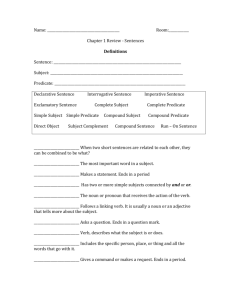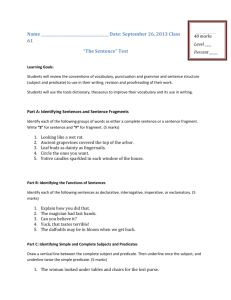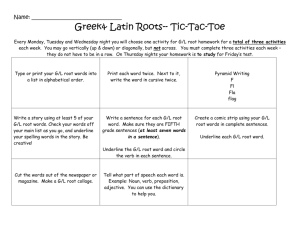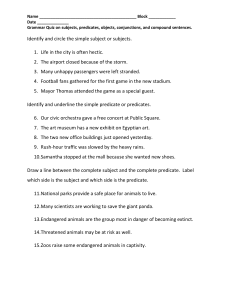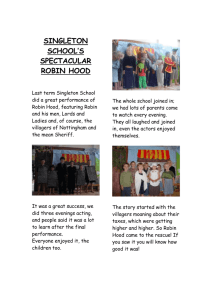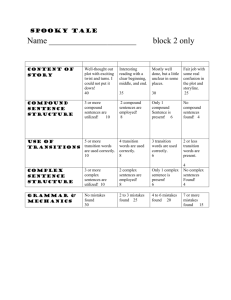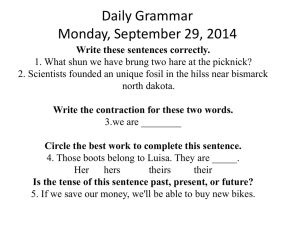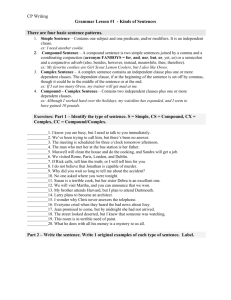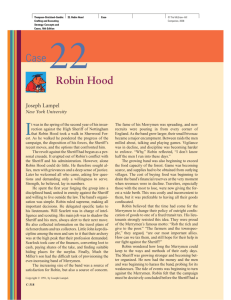Unit 8 – Grammar Practice
advertisement
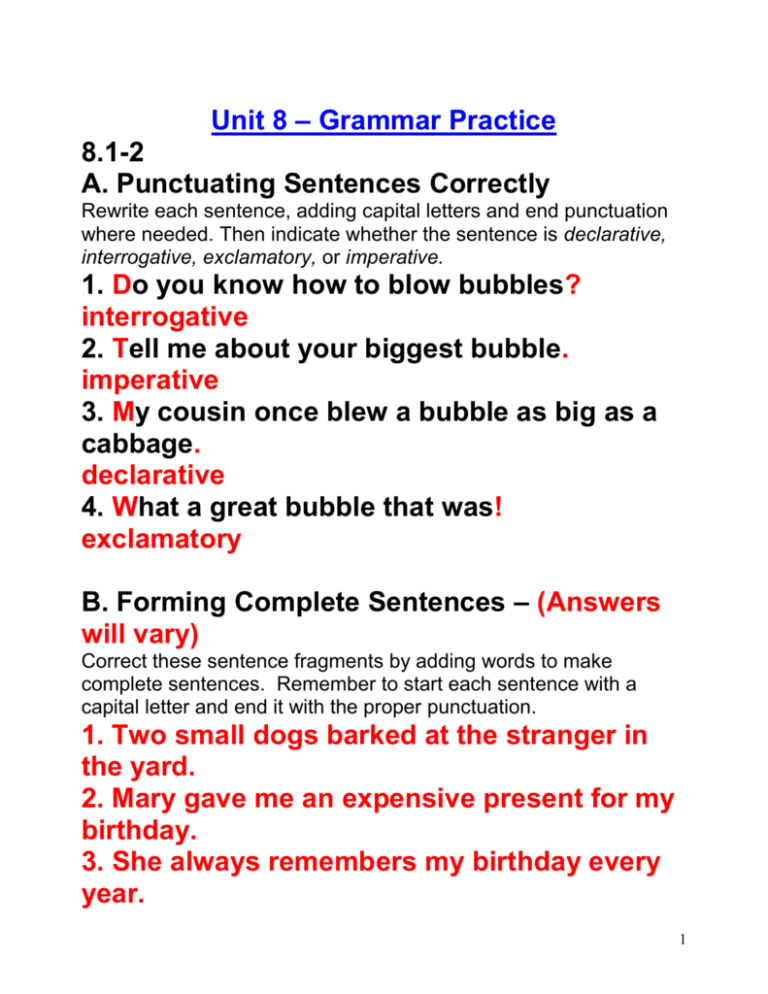
Unit 8 – Grammar Practice 8.1-2 A. Punctuating Sentences Correctly Rewrite each sentence, adding capital letters and end punctuation where needed. Then indicate whether the sentence is declarative, interrogative, exclamatory, or imperative. 1. Do you know how to blow bubbles? interrogative 2. Tell me about your biggest bubble. imperative 3. My cousin once blew a bubble as big as a cabbage. declarative 4. What a great bubble that was! exclamatory B. Forming Complete Sentences – (Answers will vary) Correct these sentence fragments by adding words to make complete sentences. Remember to start each sentence with a capital letter and end it with the proper punctuation. 1. Two small dogs barked at the stranger in the yard. 2. Mary gave me an expensive present for my birthday. 3. She always remembers my birthday every year. 1 4. I sometimes forget to make my bed each morning. 8.3 A. Identifying Complete Subjects and Complete Predicates Underline each complete subject once, and underline each complete predicate twice. 1. My cousin visited South America last year. 2. She took a boat ride up the Amazon River. 3. The Amazon is the largest river in the world. 4. The river flows just south of the Equator. 5. The weather was hot and humid. 6. It rained almost every day. 7. Over fifteen hundred species of fish live in the Amazon. 8. The jungle grows right up to the water’s edge. 9. She saw many exotic birds. 10. Her favorite was the toucan. 2 B. Identifying Simple Subjects and Simple Predicates Underline each simple subject once and each simple predicate twice. 1. Her younger brother took lots of photos. 2. His favorite photograph shows a giant butterfly. 3. He always kept his camera with him. 4. Several people asked him about his camera. 5. Once, the boat stopped at a small fishing village. 6. He got some good pictures of people at work. 8.4 A. Rewriting Questions as Statements Rewrite each question as a statement. Underline each simple subject. 1. Robin Hood really did take from the rich and give to the poor. 3 2. Sherwood Forest was a safe place to hide. 3. The soldiers were able to capture him. 4. Robin did escape. B. Finding Subjects Underline each subject. Write (You) before the sentence with an understood subject. (You) 1. Tell me another story. Little John 2. On the log stood Little John. Men 3. Both men fell into the river. Sheriff 4. Out of the forest galloped the sheriff. Robin Hood 5. Was Robin Hood a good leader? 8.5 A. Identifying Compound Subjects and Compound Predicates Underline the subjects and predicates within each compound subject and compound predicate. Some sentences contain both a compound subject and a compound predicate. 1. Robin Hood and Little John ran from the soldiers. 2. Robin started a fire and told this story. 4 3. Robin, John, and Friar Tuck became the best of friends. 4. The sheriff called him an outlaw and ordered his arrest. 5. In the end, King Richard pardoned Robin, gave him back his land, and made him a knight. 6. Robin Hood and Little John robbed from the rich and gave to the poor. 7. Were the prince and the sheriff greedy? 8. Sherwood Forest gave them shelter and provided food. 8.6 A. Identifying Simple, Compound, and Complex Sentences Write whether each sentence is simple, compound, or complex. 1. George and James stayed at a ranch last summer. simple 5 2. George liked getting up early, but James slept late. compound 3. George had finished his chores before he ate breakfast. complex 4. They slept in the bunkhouse, which was near the kitchen. complex 5. James rode horses after breakfast; George helped the rancher. compound 6. George brushed the horses each morning and night. simple B. Correcting Run-on Sentences – (Answers will vary) Correct the following run-on sentences. 1. Maria looked around, but Laurie ran. 2. The school closed for the summer. We were happy. 3. The bus turned left, but the car went straight. 4. The movie ended, and we went. Have a good day! 6

